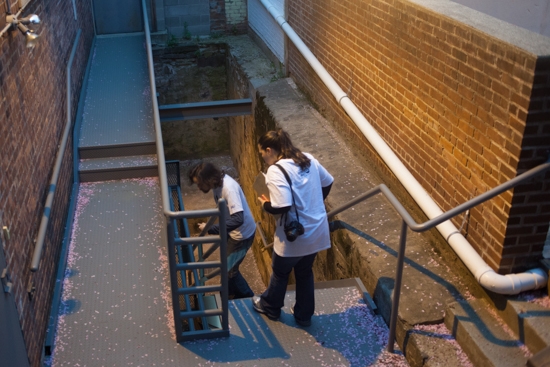
Thomas MacMillan Photo
100-day campaign volunteers conduct a pre-dawn canvass in May.
New Haven discovered a quick way to find homes for over 100 chronically homeless people: working together.
That simple discovery emerged at a briefing and “roundtable” held Tuesday afternoon for Connecticut’s two U.S. senators.

Kathleen Cei Photo
Organizers of a “100-Day Challenge to End Homelessness” held the event at the United Way offices on James Street to discuss results of a campaign begun in mid-April. The campaign aimed to find permanent housing by August for 75 percent of New Haven’s “chronically” homeless population — people who have been living on the streets consecutively for a year or periodically for three years; and who have chronic mental health or substance abuse problems. The target number of people to house was 107.
The campaign’s underlying goal is eventually to end homelessness (rather than relying on temporary shelters), in part by having agencies that deal with the homeless work as a team rather than in “silos.”
Two key results announced Tuesday:
• The coalition found homes for 102 of the 107. Forty-three are already in apartments. Another 59 have been “matched” to homes, meaning the campaign has found them places and the paperwork is in progress.
• That “match” process got a whole lot shorter. It used to take up to three years to find a person permanent supportive housing and then finally get the person moved in, organizers claimed. In this campaign the “match” process was shortened to 30 days.

Kathleen Cei Photo
“We should all pat ourselves on the back. We have made significant strides toward ending homelessness,” remarked Columbus House chief Alison Cunningham (pictured).
How that happened led to a more enduring story. As part of the 100-day campaign, agencies from the Columbus House shelter and Christian Community Action to United Way and city government and housing authority to Yale to the hospital to health clinics and social-service agencies worked as a team. They prepared a single form for everyone to use in signing up for housing. They compiled one list of chronically homeless people seeking housing. Liaisons kept track of where those people were week to week; previously, someone on a list might disappear from view for months after landing in the hospital, say, observed Cunningham. The team worked together to speed up paperwork for the “match” process, with Yale-New Haven Hospital setting up two locations for obtaining medical records and even the Department of Motor Vehicles waiving fees two days a week. (Click here for a story about the paperwork strategy.)
The team plans to follow up with the 102 people helped in the campaign to see if they remain in the homes, and how to address reasons some may not. Right now no date has been set for the follow-up, according to organizer Leigh Shields-Church of Shelter Plus Care.

Kathleen Cei Photo
“You have shown if we come together … if we share resources, we can make a difference in this community,” Mayor Toni Harp (pictured) told the group.
The coordinated approach, participants vowed, will stay in place as they continue the campaign to end, not just temporarily respond to, homelessness. The 100-day campaign revealed that there’s plenty of work left to do: The campaign reported that 687 homeless individuals and families overall (including the smaller group of chronically homeless) are living here.
Previous coverage of the 100-day campaign:
• 98 Homeless People Win “Golden Tickets”
• 100-Day Challenge Homes In On Homeless
• 100-Day Homelessness Crusade Hits The Streets
• Help House The Homeless
• 100-Day Homelessness Challenge Kicks Off
• 3 Arrested, 86 Matched To Housing